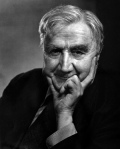
Is this another renaissance in British music? asked Michael Salmon in the first meeting of the Society’s new season. British music seems to have gone through several waves with composers like Purcell and Arne in 17th Century followed by something of a lull until the first half of the last century with composers such as Elgar, Walton, Delius and Vaughan Williams.
Today there is a strong field of composers and Michael played examples by Michael Nyman, John Foulds, Patrick Hawes and Paul Carr. The evening started with a brief extract of one of Eric Satie’s Gymnopedie — no, Satie was not an undiscovered Englishman, but the piece illustrates the minimalist and impressionistic style adopted by some British born composers today.
If there is a British style, then based on the pieces we heard, it is characterised by a frequent evocation of the countryside and powerful harmonic development. It is also accessible. It is probably too soon to say if the music we heard represents a ‘new wave’ but the breadth and depth of talent was impressive.

Pieces played;
- Michael Nyman – the Piano
- John Foulds – April – England
- Patrick Hawes – The Highgrove Suite; Fair Albion; Song of Songs
- Paul Carr – Concerto for Oboe and Strings; Requiem for an Angel
- John Rutter – The Lord is my Shepherd
- Stuart Mitchell – Seven Wonders Suite
- Richard Harvey – Concerto Antico
- Nigel Hess – Piano Concerto


